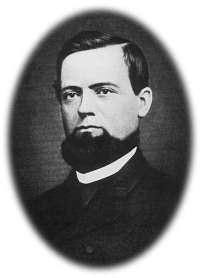 Chartered in 1855, as one of the nation’s first colleges of agricultural science, Penn State admitted its first students in 1859. During the interim, its founders searched for a president who possessed academic and scientific training, and who would be undaunted by the challenges of getting the institution up and running.
Chartered in 1855, as one of the nation’s first colleges of agricultural science, Penn State admitted its first students in 1859. During the interim, its founders searched for a president who possessed academic and scientific training, and who would be undaunted by the challenges of getting the institution up and running.
They chose Evan Pugh. A native of Chester County, Pennsylvania, he had earned a doctorate in chemistry in Germany and also studied in England. He developed a scientific course of study at Penn State that equaled or exceeded most similar courses elsewhere. Pugh aimed to expand the curriculum to include subjects that had practical value and those “classical” disciplines that formed the core of a traditional college education. This concept was embodied by the Morrill Land-Grant Act, passed by Congress in 1862.
The Pennsylvania legislature designated Penn State the Commonwealth’s sole land-grant institution in 1863. The Morrill Act required land-grant schools in each state to teach agriculture and engineering, along with science, mathematics, liberal arts, and other disciplines less overtly utilitarian. With land-grant status came financial support, prompting several other Pennsylvania colleges to lobby legislators in hopes of winning the coveted land-grant designation.
Pugh successfully rebuffed these rivals, while overseeing the start up of the curriculum, and the completion of the campus’ physical plant. But overwork weakened him. He fell ill with typhoid and died in 1864 at age 36.
>Pugh served only five years as Penn State’s president. Yet he was highly successful in laying a solid foundation for what has become one of the world’s great public universities.